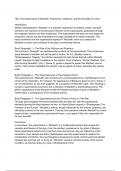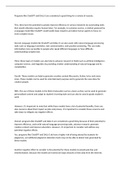Title: The Supernatural in Macbeth: Prophecies, Ambitions, and the Downfall of a Hero
Introduction:
William Shakespeare’s “Macbeth” is a dramatic exploration of ambition, power, and guilt.
Central to this narrative is the pervasive influence of the supernatural, particularly through
the enigmatic witches and their prophecies. The supernatural elements not only shape the
characters’ actions but also foreshadow the tragic downfall of the titular character. This
essay examines how the supernatural aspects in “Macbeth” serve as a catalyst for
Macbeth’s actions and contribute to the play’s overarching themes.
Body Paragraph 1 – The Role of the Witches and Prophecy:
The witches in “Macbeth” are quintessential symbols of the supernatural. Their prophecies
spark Macbeth’s ambition and set the plot in motion. As A.C. Bradley notes in
“Shakespearean Tragedy,” the witches represent the dark forces that lurk within Macbeth
himself, bringing his latent ambitions to the surface. Their prophecy, “All hail, Macbeth, thou
shalt be king hereafter!” (Act 1, Scene 3), ignites a desire for power that Macbeth cannot
control. This moment highlights the witches’ role as agents of chaos, disrupting the natural
order.
Body Paragraph 2 – The Supernatural as a Psychological Force:
The supernatural in “Macbeth” also functions as a psychological force, manifesting the inner
turmoil of the characters. For instance, the appearance of Banquo’s ghost in Act 3, Scene 4,
can be interpreted, as Jan Kott suggests, as a projection of Macbeth’s guilt. This haunting is
not just a supernatural occurrence but a reflection of Macbeth’s deteriorating psyche. The
ghost’s appearance at the banquet reveals the deepening impact of guilt on Macbeth’s
mental state, a consequence of his unnatural actions.
Body Paragraph 3 – The Supernatural and the Theme of Fate vs. Free Will:
The play also navigates the tension between fate and free will, with the supernatural
elements blurring the lines between the two. As Harold Bloom argues in “Shakespeare: The
Invention of the Human,” Macbeth’s actions, though influenced by the witches’ prophecy, are
ultimately products of his own decisions. The play thus questions whether Macbeth is a mere
puppet of fate, manipulated by supernatural forces, or an agent of free will, responsible for
his own downfall.
Conclusion:
In conclusion, the supernatural in “Macbeth” is a multifaceted element that shapes the
narrative and themes of the play. From the witches’ prophecies to the ghost of Banquo,
these supernatural aspects are more than mere plot devices; they are reflections of the
characters’ inner desires and fears. Shakespeare uses the supernatural to explore the
complexities of ambition, the psychological consequences of guilt, and the perennial debate
between fate and free will. In doing so, “Macbeth” remains a profound study of the human
condition, as relevant today as it was in Shakespeare’s time.





